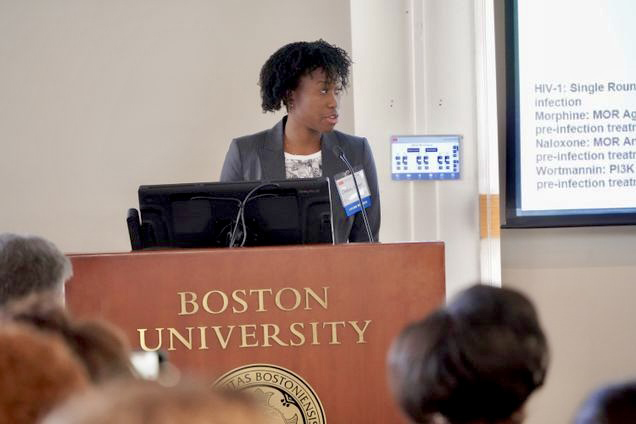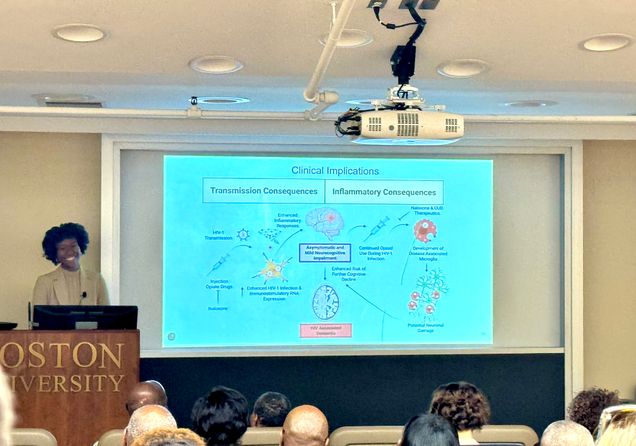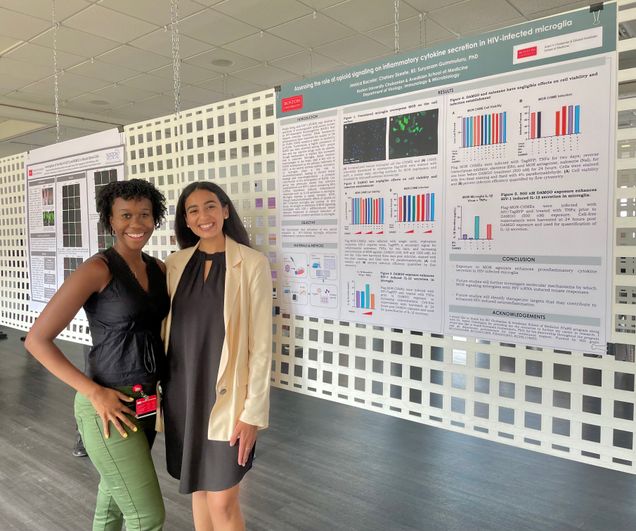GMS Spotlight: Chelsey Skeete, PhD ’25

Chelsey Skeete’s passion for science began long before she matriculated into Boston University Chobanian & Avedisian School of Medicine in 2020.
Born and raised in Boston, Skeete fondly remembers attending and participating in science fairs throughout the city and gravitating toward science books, even as a young child. As she progressed through school, teachers and mentors encouraged her to pursue extracurricular outreach opportunities that would bolster her interest in scientific research.
“I was always very passionate about seeking out those opportunities, and that passion for research just grew,” Skeete said. “To be able to research, to ask questions, to be comfortable not knowing things and to explore in the lab – and not only that, but to have an impact on the community through your findings – was very important to me.”
That drive was the catalyst for Skeete’s professional journey into STEM, first taking her to Boston College for her bachelor’s degree in biology, and then to BU Graduate Medical Sciences for her PhD. Skeete successfully defended her dissertation in June 2025.
The Journey to Boston University
As an undergraduate student in 2019, Skeete joined the summer cohort of BU’s Summer Training as Research Scholars (STaRS) Program. STaRS, an on-site summer research program, offers motivated and academically talented undergraduates an opportunity to work with a faculty mentor on an independent biomedical research project.
During her time in STaRS, Skeete performed her research under Lee Quinton, PhD, in the Pulmonary Center. After a summer working alongside BU students and mentors, she knew that the BU Medical Campus was where she belonged for the next step of her education.
“Everything was just very collaborative,” Skeete said. “All the graduate students had these very complex projects, but the campus was set up with all these different cores and labs who were willing to share information and willing to have multi-lab meetings on a weekly basis.”

Skeete applied to the Program in Biomedical Sciences (PiBS), her top-choice PhD program, and matriculated in the Fall of 2020. The PiBS program offers students the unique opportunity to rotate through three different laboratories during their first year before joining a specific department in their second year.
For Skeete, her rotations helped solidify her interest in host-pathogen interactions. She rotated in two labs in the Department of Virology, Immunology and Microbiology (VIM), as well as another lab focused on cancer research.
She ultimately chose to specialize in VIM and joined the lab of Rahm Gummuluru, PhD, professor and vice chair of virology, immunology & microbiology.
Multidisciplinary and Collaborative Research
Skeete’s dissertation research in the Gummuluru Lab focused on the effects of opioids on individuals infected with HIV in the brain.
A new project at the time, Skeete’s research studied how this intersection can impact a person from an immunology lens, studying how opioid use with an HIV diagnosis impacts inflammation and leads to different neurocognitive disorders.

“People with HIV and who are also using drugs or opioids are often overlooked in our healthcare system,” Skeete said. “They often have limited resources, and it’s important that we continue to research the best practices and ways to help them.”
Skeete’s project was interdisciplinary and gave her the opportunity to collaborate with different labs and cores at the Medical Campus. In particular, she worked closely with the lab of Gustavo Mostoslavsky, MD, PhD, in the Center for Regenerative Medicine to develop a specific type of brain cell called microglia. While developing the cells was a challenge, Skeete found the process rewarding and enjoyed the chance to connect with scientists across campus. Her research findings highlight how opioid treatment enhances multiple stages of HIV-1 replication and virus-induced inflammation in human brain cells known as microglia.
“In science, there is always going to be trial and error,” Skeete said, “There are going to be times when things don’t work, and you’ll need to adjust and modify. I’m just very grateful for a team that was willing to stick through the process and be able to look and see how we together could improve the overall model until it became a well-established model.”
Skeete presented her research at the Society for Neuroscience Conference in Washington, D.C., in 2023. Her work, “Mu opioid receptor activation in microglia enhances HIV-1 infection and HIV-infection-induced inflammatory responses” was published in Frontiers in Immunology in October 2025.
“While it’s important to gain those wet lab skills and those analytical and critical thinking skills, it’s also important to learn how to communicate your research to broad ranges of audiences,” Skeete said. “I’m very grateful to have had the opportunity to present my work at conferences like the Society for Neuroscience and be able to translate my work from a heavy virology and immunology perspective into a neuroscience community.”
Building Community Within and Beyond Research
Community is key for Skeete, both on and off campus.
Skeete volunteers with the National Association for the Advancement of Colored People (NAACP), where she volunteers with high school students to inspire their passion for STEM through outreach programs.
“To me, it’s very important that I stay connected with the community and continue to give back to the community,” Skeete said. “I’m very passionate about outreach and STEM education.”

During her time in GMS, Skeete served as a student liaison to leadership to advocate for student concerns and brainstorm ideas to improve campus culture and improve community and belonging for all student populations. She also returned to the STaRS program as a mentor in 2023 and 2024, where she guided undergraduate students on their research projects and presentations.
“It was extremely rewarding to watch their passion for research blossom throughout the program,” Skeete said.
Skeete greatly valued the different mentors and support systems she built throughout her academic journey: mentors such as Assistant Professor Hisashi Akiyama, PhD, who helped Skeete learn to “think like a scientist,” as well as her family, friends and church community who continued to guide her through the difficult moments.
“They were key in encouraging me along the way, especially when challenges came… and it seemed like the whole world was against what I was trying to do,” Skeete said.
Next Steps in STEM
Having defended her dissertation, Skeete is ready to move into the next step of her professional career. She has accepted a program manager position with Novartis, where she will manage an outreach program in STEM education.
The position marks a full circle moment for Skeete, who was so significantly encouraged by her own participation in outreach programs throughout her journey.
“It’s just so important to me that we continue to equip the next generation of scientists to really teach them how to think as scientists and encourage them in their calling within STEM.”
As she prepares to move into her new role, she advises future BU students to “value and respect all the people and talent that is around you, and to not be afraid of establishing connections.”
Being able to communicate science in an increasingly fragmented world is key to connecting communities and reinforce the significance of scientific research that is being done across the country.
“I think a very important way for us to move forward is to be able to learn how to communicate the importance of our work, and share your research, not just to your inner science bubble, but to all audiences.”